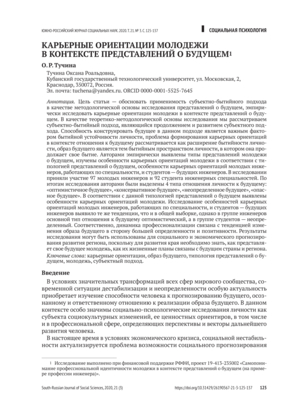Аннотация
Цель статьи — обосновать применимость субъектно-бытийного подхода в качестве методологической основы исследования представлений о будущем, эмпирически исследовать карьерные ориентации молодежи в контексте представлений о будущем. В качестве теоретико-методологической основы исследования мы рассматриваем субъектно-бытийный подход, являющийся продолжением и развитием субъектного подхода. Способность конструировать будущее в данном подходе является важным фактором бытийной устойчивости личности, проблема формирования карьерных ориентаций в контексте отношения к будущему рассматривается как расширение бытийности личности, образ будущего является тем бытийным пространством личности, в котором она продолжает свое бытие. Авторами эмпирически выявлены типы представлений молодежи о будущем, изучены особенности карьерных ориентаций молодежи в соответствии с типологией представлений о будущем, особенности карьерных ориентаций молодых инженеров, работающих по специальности, и студентов — будущих инженеров. В исследовании приняли участие 97 молодых инженеров и 92 студента инженерных специальностей. По итогам исследования авторами были выделены 4 типа отношения личности к будущему: «оптимистичное будущее», «консервативное будущее», «неопределенное будущее», «опасное будущее». В соответствии с данной типологией представлений о будущем выявлены особенности карьерных ориентаций молодежи. Исследование особенностей карьерных ориентаций молодых инженеров, работающих по специальности, и студентов — будущих инженеров выявило те же тенденции, что и в общей выборке, однако в группе инженеров основной тип отношения к будущему оптимистический, а в группе студентов — неопределенный. Соответственно, динамика профессионализации связана с тенденцией изменения образа будущего в сторону большей определенности и позитивности. Результаты исследования могут быть использованы для социального и экономического прогнозирования развития региона, поскольку для развития края необходимо знать, как представляет свое будущее молодежь, как их жизненные планы связаны с будущим страны и региона.
Ключевые слова
Информация о финансировании
Исследование выполнено при финансовой поддержке РФФИ, проект 19-413-235002 «Самопонимание профессиональной идентичности молодежи в контексте представлений о будущем (на примере профессии инженера)».
Библиографические ссылки
Абульханова, К.А., Березина, Т.Н. (2007). Время личности и время жизни. СПб.: Изд-во «Алтейя».
Аполлонов, И.А., Тучина, О.Р. (2019). Региональная идентичность как фактор психологической безопасности. Гуманизация образования, 5, 166–179. DOI: 10.24411/1029-3388-2019–10061
Арапова, П.И. (2015). Образ будущего и выбор жизненного пути в юношеском возрасте. Вестник Православного Свято-Тихоновского гуманитарного университета. Серия 4: Педагогика. Психология, 1(36). 122–129. DOI: 10.15382/sturIV201536
Бочарова, Е.Е. (2014). Временная перспектива личности студента с разным уровнем адаптационной готовности. Известия Саратовского университета, 1, 57–63.
Василенко, Т.Д. (ред.) (2011). Жизненный путь личности: время и смысл человеческого бытия в норме и при соматической патологии. Курск: Изд-во Курского гос. мед. ун-та.
Воробьева, К.И. (2012). Временная транспектива как моделирование жизненного пути. Социальные и гуманитарные науки на Дальнем Востоке, 2(34), 23–25.
Гинзбург, М.Р. (1988). Личностное самоопределение как психологическая проблема. Вопросы психологии, 2, 19–26.
Головаха, Е.И. (2009). Жизненная перспектива и ценностные ориентации личности. В Л.В. Куликов Психология личности в трудах отечественных психологов: хрестоматия. СПб.: Изд-во «Питер».
Знаков, В.В., Рябикина, З.И. (2017). Психология человеческого бытия. М.: «Смысл».
Леонтьев, Д.А., Шелобанова, Е.В. (2001). Профессиональное самоопределение как построение образов возможного будущего. Вопросы психологии, 1, 57–65.
Прусова, Э.В. (2006). Проблема взаимосвязи образа будущего личности с удовлетворенностью профессиональным выбором в юношеском возрасте (Кандидатская диссертация). Краснодар.
Канищева, М.А., Карнаухов, В.А. (2016). Особенности организованности образа будущего студентов с разным уровнем субъективного контроля. Научные ведомости Белгородского государственного университета. Гуманитарные науки, 14 (235),131–135
Нестик, Т.А., Шаповалова, О.С., Плужник, С.А. (2019). Социальная идентичность и временная перспектива личности как предпосылки отношения к коллективному прошлому, настоящему и будущему. Социальная и экономическая психология, 4(16), 102–126.
Нюттен, Ж. (2004). Мотивация, действие, перспектива будущего. Москва: «Смысл».
Сапогова, Е.Е. (2014). Жизненный и экзистенциальный опыт в автобиографических нарративах личности. Вопросы психологии, 1, 68–79.
Слободчиков, В.И. (2017). Проблемы развития и воспитания личности в студенческом возрасте. Социальное воспитание, 2, 4–10.
Цариценцева, О.П. (2010). Карьерные ориентации современной молодежи. Международный журнал прикладных и фундаментальных исследований, 6, 73–74.
Angelo, R.P., Chambel, M.J. (2015). The Reciprocal Relationship between Work Characteristics and Employee Burnout and Engagement: a Longitudinal Study of Firefighters. Stress Health, 31, 106–114.
Beck, U. (2002). The Cosmopolitan Society and its Enemies. Theory, Culture and Society, 19 (1–2), 17–44.
Boniwell, I., Osin, E., Sircova, A. (2014). Introducing Time Perspective Coaching: A New Approach to Improve Time Management and Enhance Well-Being. International Journal of Evidence Based Coaching & Mentoring, 12(2), 24–40.
Bühler, Ch. (1962). Genetic Aspects of the Self. In Fundamentals of Psychology of the Self. Annals of the New York Academy of Sciences, 96, art. 3.
Feather, N.T., Bond, M.J. (1994). Structure and Purpose in the Use of Time. In Psychology of Future Orientation (pp. 121–140). Lublin: Towarzystwo Naukowe KUL.
Lennings, C.J. (1996). Self-Efficacy and Temporal Orientation as Predictors of Treatment Outcome in Severely Dependent Alcoholics. Alcoholism Treatment Quarterl, 14, 71–79.
Levin, K. (2010). Resolving Social Conflicts and Field Theory in Social Science. Washington: American Psychological Association.
McKenna, F.P. (1993). It Won’t Happen to Me: Unrealistic Optimism or Illusion of Control? Brit. J. Psychol., 84, 39–50.
Tonna, B., Hemrick, A., Conrad, F. (2006). Cognitive Representations of the Future: Survey Results. Futures, 38, 810–829.
Wakslak, Ch. J., Nussbaum, Sh., Liberman, N., Trope, Y. (2008). Representations of the Self in the Near and Distant Future. J. Person. and Soc. Psychol., 95(4), 757–773.
You, X., Huang, J., Wang, Y., Bao, X. (2015). Relationships between Individual-Level Factors and Burnout: A Meta-Analysis of Chinese Participants. Personality and Individual Differences, 74, 139–145.
Yudkowsky, E. (2008). Cognitive Biases Potentially Affecting Judgment of Global Risks. In N. Bostrom, M.M. Ćirković (Eds). Global Catastrophic Risks (pp. 91–119). N.Y.: Oxford Univ. Press.
Zaleski, Z. (1994). Towards a psychology of the personal future. In Psychology of Future Orientation (pp. 10–20). Lublin: Towarzystwo Naukowe KUL.
Zhang, J.W., Howell, R.T., Stolarski, M. (2013). Comparing Three Methods to Measure a Balanced time Perspective: The Relationship between a Balanced Time Perspective and Subjective Well-Being. Journal of Happiness Studies, 14(1), 169–184.
Zimbardo, Ph., Boyd, J. (2008). The Time Paradox: The New Psychology of Time That will Change Your Life. N.Y.: Free Press.


